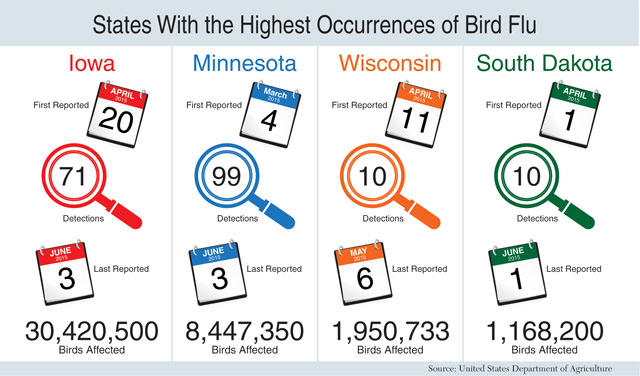Bird Flu Disrupts Midwest Trucking Operations

This story appears in the June 8 print edition of Transport Topics.
The avian flu virus that has hit the poultry industry hard in the Midwest has disrupted trucking and caused some carriers to shift operations, according to industry and government officials.
The virus, known as bird flu, has infected more than 47 million birds nationwide, according to the U.S. Department of Agriculture.
The outbreak started in December and has been reported in 19 states. The loss from the outbreak is about $1 billion in the two hardest-hit states alone, Iowa and Minnesota, according to estimates by universities in those states.
U.S. poultry losses through the end of May represented 9.2% of egg-layer and 6.9% of turkey inventory, USDA said. A University of Minnesota study estimated the projected loss of $113 million in poultry production is resulting in more than $200 million in lost economic activity. Iowa State University estimated the value of eggs that won’t be sold by that state — the country’s largest egg producer — at $600 million.
The Minnesota study said that for every $1 million of lost poultry and egg production trucking companies lost $24,000 in sales, said Brigid Tuck, senior economist and its lead author. It also said that every job lost at poultry processors affected nine trucking jobs in Minnesota and that truck transportation accounts for 4 cents of every dollar spent by poultry processors.
An Iowa-based trucking company executive said last week the company was shifting some operations.
Ruan Transportation Management Systems’ business from a Nebraska customer and three closed Iowa facilities has been reduced by “about 40 loads a week and about a half a million dollars annualized, and it will take about four months to bring all that back,” said Ralph Arthur, president of Ruan’s dedicated contract carriage division.
Des Moines-based Ruan, ranked No. 38 on the Transport Topics Top 100 list of U.S. and Canadian for-hire carriers, ships liquid eggs in tanker trucks, and even if a farm is deemed uncontaminated, truck entry and egress are restricted to just one point, Arthur said.
As a result, “you lose time, you add more miles because of the restrictions and they limit your trucks to certain locations, so it takes a mostly smooth operation and makes it a little more difficult to manage,” he told TT.
Arthur said Ruan will park some tank trucks and shift drivers to the company’s other operations.
“The drivers won’t be hauling eggs, but they’ll be doing something else that keeps them busy,” he said. When farms return to full operation, those drivers can come back or remain in their new jobs, and Ruan will then recruit for the egg business, he added.
In Minnesota, many of the flu’s effects were not “causing trucking companies to lay off drivers or employees; they’re just chasing other freight as a result,” said John Hausladen, president of the Minnesota Trucking Association.
“If you’re a feed company, that’s the kind of trucking [the report] is talking about. That has a much more direct effect,” he said.
“We’ve had some members report customers not wanting them to drive through certain counties that have had highly pathogenic influenza, so there’s been some rerouting,” he said.
But “even if the disease went away today, you’re looking at months of disruption before things settle back into a normal pattern,” Hausladen said, noting that a recent MTA survey showed that carriers that shipped cardboard boxes to turkey farms reported reduced business.
In Iowa, Gov. Terry Branstad extended a state of disaster emergency declaration through July 1 from an original May 31 end date. The state had 68 reported bird flu outbreaks in 18 counties through the end of May.
“We have a number of members reporting that they are losing loads associated with the egg-laying operations and chicken farms that have been virtually closed down,” said Brenda Neville, president of the Iowa Motor Truck Association.
About 35 trucking companies that responded to an IMTA survey indicated they were losing from three to 40 loads a week, she told TT.
“The loss of revenue is excessive, [and] diversification is key to the success for many trucking companies,” she said.
Bob Riley, CEO of Feed Energy Co. in Pleasant Hill, Iowa, said bird flu was causing a major ripple effect throughout the industry.
“Thirty to 40% of feed business will be lost, which will potentially result in many jobs lost not only in our industry but clear through to the retail level,” he said in a statement released by the Iowa Poultry Association in late May.
Neville agreed, saying, “The bigger issue is the short- and long-term impact on the general economy of the state. There are a number of small communities in rural Iowa that rely tremendously on these chicken-egg laying operations that are now at a standstill.”

